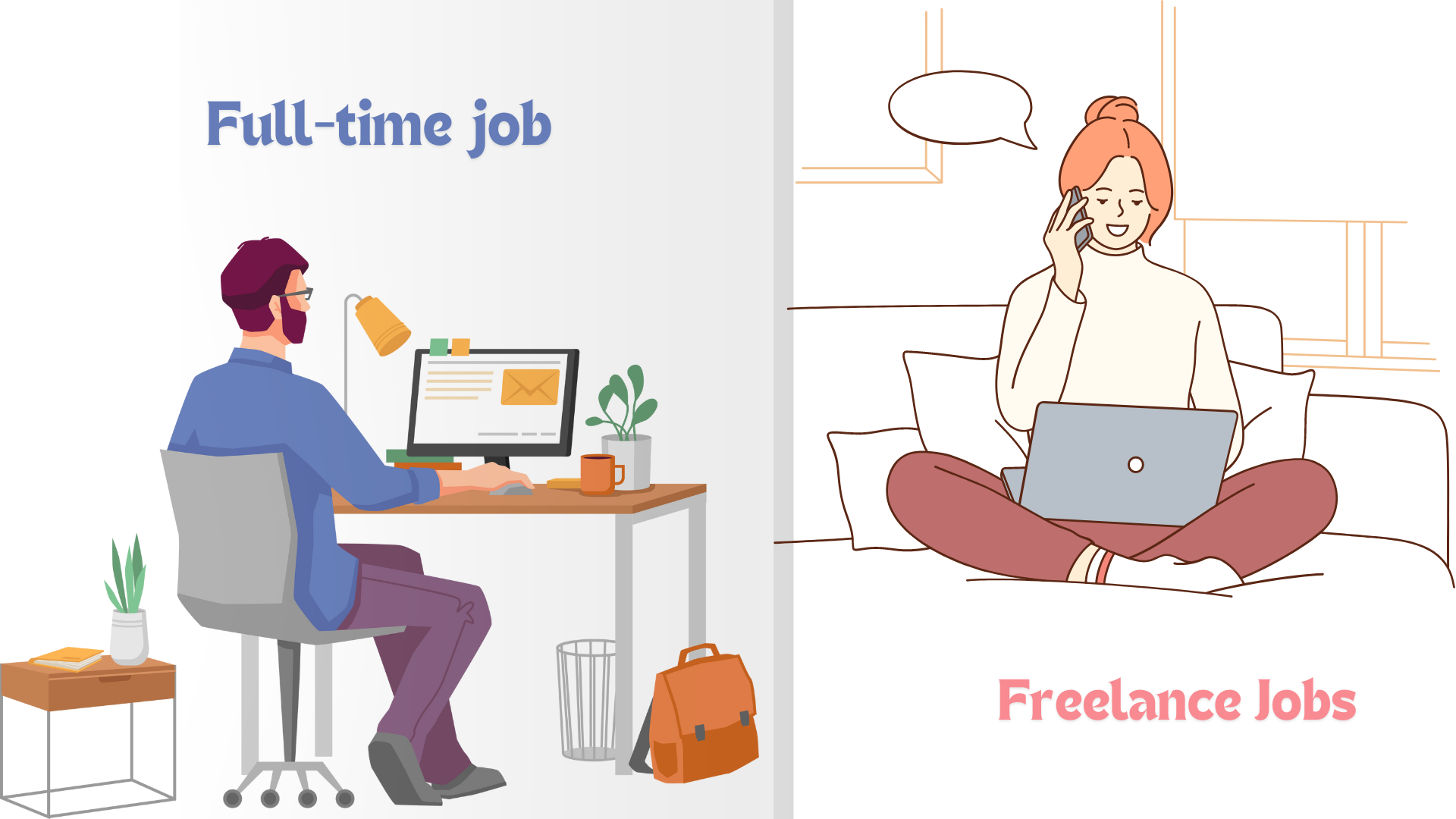
The choice between full-time and freelance work depends on individual preferences, career goals, and lifestyle needs. Full-time jobs offer stability and benefits, while freelance work offers flexibility, autonomy, and higher earnings.

Making crucial decisions when beginning a career includes selecting between traditional full-time employment and freelancing. There are a lot of questions, things to think about, and things to reflect upon when these two paths clash. In this comprehensive overview, we will explore the subtle differences between full-time employment and freelancing, helping you weigh the benefits and drawbacks and identify the elements that will influence your choice.
Understanding Freelancing:
Freelancing is a requirement for working as a self-employed professional and is frequently linked to independence and flexibility. Independent contractors possess the liberty to select their own assignments, establish their own timetables, and operate from any location. The attraction of working as an independent contractor is its capacity to offer a varied portfolio, more control over workload, and simultaneous exploration of several industries.
Pros of Freelancing:
- Flexibility: Independent contractors are able to work whenever, wherever, and however they please. Particularly appealing to people who like non-traditional work structures is this flexibility.
- Diverse Opportunities: Independent contractors can work on a variety of projects and clients, gaining experience that is always evolving and dynamic.
- Autonomy: Being able to run their own show and make their own decisions is important to a lot of independent contractors.
- Location Independence: One of the main advantages of freelancing is that it allows you to work from anywhere and reach a worldwide clientele.
Cons of Freelancing:
- Income Stability: Since independent contractors work on a project-by-project basis, their income is subject to change, which can lead to unpredictable times financially.
- No Benefits: Unlike regular employees, independent contractors are responsible for covering their own expenses for things like health insurance, retirement savings, and paid time off.
- Self-Marketing: Seeking clients requires proactive, sometimes challenging, self-marketing initiatives.
Understanding Full-Time Employment:
Full-time employment refers to the conventional paradigm wherein individuals receive a salary or hourly wage and work for a single employer on a predetermined schedule. Stability, benefits, and a feeling of integration within a broader organisational structure are provided by this structure.
Pros of Full-Time Employment:
- Stability and Predictable Income: Financial stability is often afforded to permanent employees by a regular income and pay schedule.
- Benefits Package: A lot of full-time jobs come with paid time off, retirement plans, and health insurance, all of which are important for general wellbeing.
- Opportunities for Professional Development: Training programs, workshops, and advancement opportunities are common ways that employers support the professional development of their full-time staff members.
- Teamwork: A positive work environment is produced by full-time employment, which encourages a sense of community and cooperation among coworkers.
Cons of Full-Time Employment:
- Limited Autonomy: Higher-level administration usually makes decisions about projects, schedules, and work processes, limiting individual autonomy.
- Career Advancement Challenges: Development within a company may be constrained by organizational structures and timelines, potentially slowing career progression.
- Limited Flexibility: Compared to freelancers, permanent staff may have less flexibility in terms of work hours and location.
Choosing the Right Path for You:
Now that we've examined the pros and cons of freelancing and full-time employment, let's explore key factors that can guide your decision:
- Workstyle Preferences: Consider your preferred work environment. Do you thrive in a structured, team-oriented environment or do you prefer independence and flexibility?
- Financial Considerations: Assess your financial situation and comfort level with income volatility. Freelancers should plan for potential income fluctuations, whereas full-time employees may prefer consistent income.
- Career Goals: Establish your long-term career objectives. Working full-time may offer a clear path for career advancement within a company, whereas freelance work allows for a wide range of experiences and skill development.
- Risk Tolerance: Assess your risk and uncertainty tolerance. Freelancing involves entrepreneurial risks, whereas full-time employment provides a more stable career path.
- Lifestyle Preferences: Consider your preferred way of living. If you require location independence and a flexible schedule, freelance work may be a better fit for your needs.
Conclusion, today's dynamic professional landscape, the choice between freelancing and full-time employment is highly subjective and deeply personal. By weighing the pros and cons, understanding your priorities, and taking into account your long-term goals, you can make an informed decision that fits your specific career path.
Finally, whether you prefer the freedom of freelancing or the security of full-time employment, remember that your career path is an ever-changing journey. As you navigate the ever-changing work landscape, the key is to adapt, learn, and prioritize your professional and personal well-being.
People also search for:
1. Can a full time employee work as a freelancer
Depending on the terms of the employment contract and corporate rules, a full-time employee may work as a freelancer. In order to prevent conflicts of interest or performance problems, some employers forbid outside work. Generally speaking, if there is no conflict with the interests of the employer, freelancing during non-working hours is permitted. Observe local labour regulations and always review your contract.
2. Can freelancing be a full time career
In actuality, working as a freelancer may be a full-time job! It provides freedom, flexibility, and the chance to make a good living. Many professionals use their writing, graphic design, programming, marketing, and other skills to their advantage when working as freelancers. Building a solid clientele, upholding constant quality, and skilfully handling money are all necessary for success. For those who are prepared to put in the work, freelancing can be a fulfilling and long-lasting career choice, despite its drawbacks, which include irregular income and the requirement for self-control.
3. Can i work full time and freelance
It is possible to work both freelance and full-time jobs at the same time, but it takes careful planning and great time management. Make sure your freelance work doesn't interfere with your full-time duties or corporate regulations. Finding a balance between the two might lead to opportunities for professional development and extra cash.


